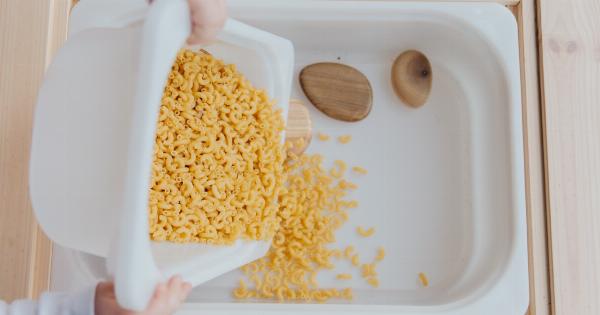Babies can suffer from constipation just like adults do. It can make them feel uncomfortable, colicky, and disrupt their sleep and feeding schedules.
As a parent, you want to do everything you can to relieve your baby’s constipation and get them feeling comfortable again.
What causes constipation in babies?
There are several reasons why your baby may be experiencing constipation:.
- Switching to a new formula or starting solids
- Dehydration
- Not enough fiber in their diet
- Slow-moving bowels
- Medications such as antibiotics
- Medical conditions such as hypothyroidism or Hirschsprung’s disease
What are the symptoms of constipation in babies?
Constipation can manifest in different ways in babies depending on their age and diet. Here are common symptoms to watch out for:.
- Infrequent bowel movements (less than once a day for infants and less than three times a week for older babies)
- Hard, pebble-like stool
- Straining and grunting
- Discomfort and fussiness
- Refusal to eat or reduced appetite
- Bloating and gas
- Rectal bleeding caused by tears in the anus from straining
How to relieve your baby’s constipation
There are several remedies you can try to relieve your baby’s constipation:.
1. Offer more fluids
Breastfed babies do not need additional water until six months of age, as breast milk is sufficient hydration. For formula-fed babies, try offering water between feedings.
For babies over six months old who have started solids, offer water, diluted fruit juices, and soups.
2. Try a different formula or food
If you’ve recently switched formula or started solids, your baby’s digestive system may be getting used to the new food. Try going back to the old formula or offering a different type of food to see if it relieves constipation.
3. Give fruits and vegetables
Offer high-fiber fruits and vegetables, such as pears, plums, prunes, peaches, apricots, apples, bananas, peas, beans, sweet potatoes, and broccoli. These foods can help soften stool and promote bowel movements.
Be sure to introduce new foods gradually and in small amounts to see what your baby tolerates.
4. Massage your baby’s belly
Gently massaging your baby’s belly can stimulate bowel movements and relieve discomfort. Use your fingertips to rub in a clockwise direction around your baby’s navel.
Alternatively, place your baby on their back and bend their legs and move them in a bicycling motion.
5. Use a warm compress
Place a warm water bottle or a warm compress on your baby’s belly for a few minutes. The heat can help relax their muscles and promote bowel movements.
6. Consider probiotics
Probiotics are live microorganisms that can promote digestive health by balancing the gut flora. They are especially helpful if your baby has recently finished a course of antibiotics.
Consult with your pediatrician to see if probiotics are appropriate for your baby.
7. Try over-the-counter medications
If your baby’s constipation persists even after trying home remedies, you may consider over-the-counter medications. However, you should always consult with your pediatrician first to avoid any adverse effects or potential drug interactions.
Common medications include glycerin suppositories and oral laxatives.
When to call the doctor
In some cases, constipation could be a sign of an underlying medical condition. Call your pediatrician if your baby has:.
- No bowel movement for three or more days
- Bloody stools
- Fever
- Vomiting
- Abdominal swelling
- Weight loss
Conclusion
Constipation can make your baby feel uncomfortable and disrupt their daily routine.
However, there are several remedies you can try, including offering more fluids, fruits and vegetables, massaging their belly, and considering probiotics and over-the-counter medications. If your baby’s constipation persists or is accompanied by other symptoms, call your pediatrician to rule out any serious underlying conditions.






























